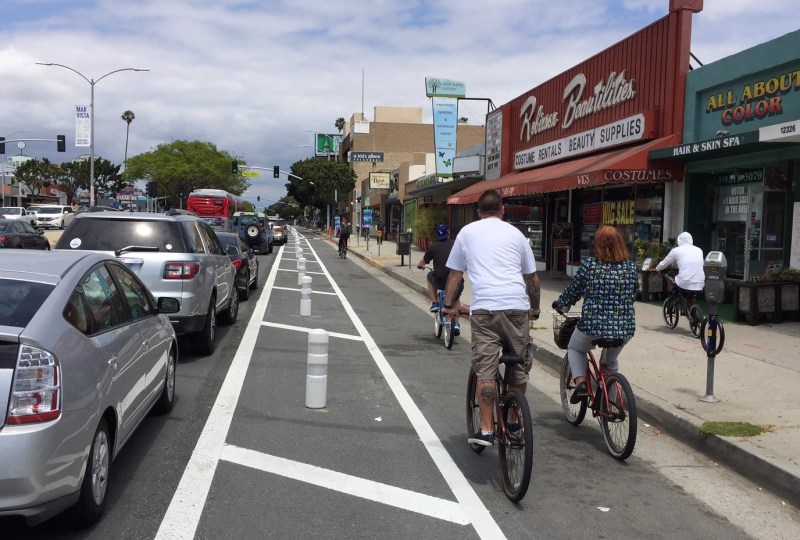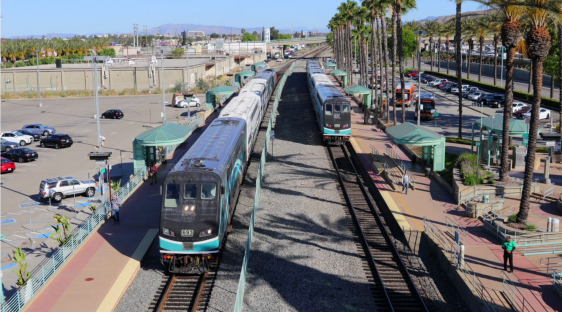Advocates, alert: ""Keep L.A. Moving," a small, vindictive group of well-heeled westsiders with little regard for the safety of L.A.'s most vulnerable and disadvantaged residents, is now pushing its disinformation to a national audience -or, at least, attempting to - by rebranding itself as "Keep The U.S. Moving."
The origins of their outrage lie in safety improvements in the affluent coastal L.A. neighborhood of Playa Del Rey (PDR). In 2017, the L.A. Department of Transportation (LADOT) implemented about four miles of road diet safety improvements. Although the immediate impetus for the improvements was a lawsuit over the death of 16-year-old Naomi Larsen, area residents had long asked to see speeding behavior curbed on local streets.
The road diets served their purpose, but entitled Westside drivers, many of whom live outside the city of L.A., were appalled at the minor inconvenience a slower rush hour imposed upon them. At meetings, drivers chanted, "Give us our lanes back!"
Keep L.A. Moving soon surfaced in the summer of 2017, filing a lawsuit to restore PDR streets to their original condition. Its leaders got appointed to a PDR street safety task force, where they aggressively shouted down data-based analysis in favor of subjective accounts of business hardships. More adamant social media trolls wondered aloud if the life of a pedestrian or cyclist here or there wasn't a reasonable trade-off for a faster commute.
There were also undercurrents of anti-government resentment and xenophobic beach community nativism. After the lawsuit, meeting disruptions, and a threat to recall the local City Councilmember (a campaign that ultimately failed miserably), the city undid the road diets.
KLAM leadership includes co-founder and "Chief Analytics Officer" John Russo, a Playa Del Rey engineer. KLAM Chief Executive Officer Karla Mendelson lives outside Los Angeles, in neighboring Manhattan Beach. She advocates for unfettered car access to L.A. streets while pushing to preserve “car-free neighborhood […] walkstreets” in her own city.
This group would certainly not be the first to put their own convenience above everyone else's needs.
In 2015, another anti-road-diet group, Fix the City, sued the city over its multi-modal Mobility Plan 2035. Their central complaint was that the city “want[ed] to make driving our cars unbearable by stealing traffic lanes from us on major streets and giving those stolen lanes to bike riders and buses,” and that, “…not all of us — in fact, very few of us — have the luxury of being able to ride to work on a bike or bus.”
Much like Keep L.A. Moving, the well-to-do residents behind Fix the City had the "luxury" of being able to speak of mobility in terms of convenience and choice. Too many of their fellow Angelenos, on the other hand - by virtue of their lower-income status and the disinvestment in their communities - have precious few options for how they move around the city. They are in desperate need of basic protections and pathways that will allow them to travel safely. Yet these kinds of frivolous actions elevating the voices of those who already have every advantage make that nearly impossible.
Fix the City helped embolden councilmembers to nix the bike lane planned for Central Avenue, one of the most heavily bike-trafficked streets in the city and a lifeline for riders of necessity.
And now, Keep L.A. Moving - emboldened by their success in undercutting Playa Del Rey street safety - is spreading their message to other communities.
The group stoked resistance to Mar Vista pilot safety improvements, though those road diet upgrades heeded the safety data and were recently made permanent. KLAM also amplified criticism against a proposed road diet for a dangerous section of Temple Street in central L.A. The upgrades were eventually scrapped and replaced by watered-down non-diet measures. Facing this backlash, LADOT hit the brakes on the meager list of planned Vision Zero road diet projects throughout the city.
It is no coincidence that these groups target Vision Zero, one city initiative that formally, albeit imperfectly, prioritizes disadvantaged communities.
The road diet backlash hit South Central L.A. particularly hard. Not even a horrific series of deadly hit-and-runs that marked the beginning of 2018, including the loss of 22-year-old Frederick "Woon" Frazier, or the rallies Frazier's family and friends, have held succeeded in getting LADOT to budge on road diet implementation.
But KLAM was not satisfied and worked to spread harm outside the city of Los Angeles. In northeast L.A. County, Keep Pasadena Moving rallied drivers to shout down a road diet proposed for Orange Grove Boulevard. In nearby Orange County, Keep Tustin Moving blocked planned downtown revitalization walkability improvements. Russo even inserted himself into Seattle anti-bike lane efforts after the local group's moms don't bike tweet went embarrassingly viral.
In December, safe streets advocates staved off KLAM's latest campaign. L.A.'s quasi-governmental Neighborhood Council Coalition was set to approve a sweeping anti-road-diet motion but instead approved a neutral statement calling for community engagement on road diets and other traffic calming measures.
KLAM now has copy-and-paste rebranded itself as "Keep the U.S. Moving." Their national Facebook group, with a whopping 42 members today, is managed by Russo and Keep Waverly (Iowa) Moving's Matthew Schneider.
As bicycle advocate Peter Flax has noted, KLAM's work seems to thrive best in closed-door conservative echo chambers, like Nextdoor and closed Facebook groups. From there, they work to seed aligned broadcast media, including right-wing radio, where their claims are not questioned. When their dubious assertions, for example "[road diets cause] more accidents, more pollution, more gridlock, heavy traffic," are actually aired in public debate, or studied using actual real world data, they just don't hold up.
Like climate change deniers, these "Keep Moving" groups deny data-based studies showing that speed kills and that road diets work.
KTUSM makes the Trump-like assertion that "road diet proponents use manipulated or outright false data and misapplied studies." The villains in their conspiracy playbook are "high-density developers" and "highly paid consulting firms" because "bike lanes make a good smoke screen for the real agenda: Money" - that is "federal money" for street projects "based on the 'Living Streets' initiative." Wait until they hear about federal highway funding!
Behind all their crackpot assertions is the empowerment of drivers in well-to-do communities. These ideologues push for unfettered driver access at the expense of safety for all road users, particularly those who have the fewest mobility choices available to them and who are most at-risk to harm. The "right" of this handful of disgruntled drivers to speed is costing the lives of tens of thousands of people in the U.S. every year. Unfortunately, this is a double whammy to low-income communities of color, whose residents continue to die at higher rates. And as Rutgers' Charles Brown points out, minority communities overlooked for road diet safety improvements "receive enforcement" instead.
Editor's note: Streetsblog does not want to provide a forum for traffic safety denial efforts. But we feel it is important that safe streets advocates nationwide be aware of what anti-safety advocates are plotting. Streetsblog acknowledges the important work of writer, bicyclist, advocate Peter Flax for tracking many details in this story.





